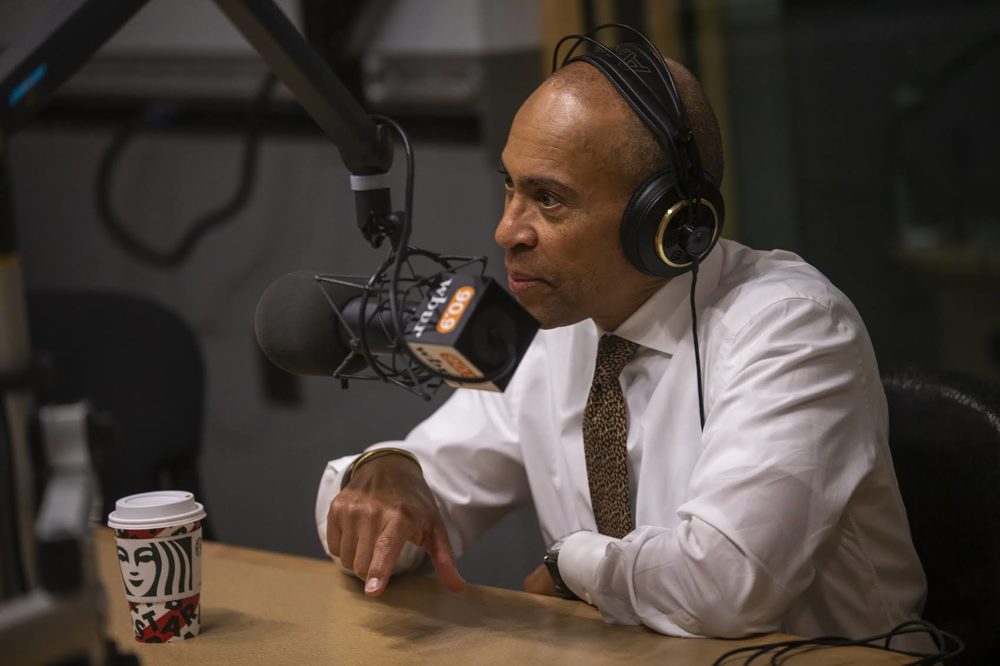Advertisement
10 Weeks Before Iowa, Checking In On The 2020 Democrats
Resume
With just 10 weeks before the Iowa caucuses, we take stock of the 2020 Democrats. Deval Patrick, one of the latest candidates to enter the race, joins the show.
Guests
Deval Patrick, candidate for the 2020 presidential nomination. Former governor of Massachusetts, former managing director at Bain Capital. (@DevalPatrick)
James Pindell, political reporter for The Boston Globe covering the 2020 presidential campaigns. Political analyst for WBUR. (@JamesPindell)
Lisa Lerer, New York Times reporter who covers campaigns, elections and political power. (@LLerer)
Highlights From Our Interview With Deval Patrick
You call yourself a progressive pragmatist. What does that mean?
“Or a pragmatic progressive? Yes. One of the things that's, I think, most exciting about this moment in politics — in a way, a moment that I have been waiting for, as a citizen, for a long time — is that we are about ambitious goals. We're not paying attention anymore to the hard-right's talking points. We're not talking ourselves out of trying to tackle big challenges facing humankind, like climate change. Or facing working people all over the country, in terms of having an economy that is growing out — so that it makes a place for folks who are coming up, and joining a productive life — and not just up to the well-connected. And I think there's some real solutions that I have seen, and worked on, both in my public life as governor, and as an advocate, and as a businessperson. So I love the idea of actually getting to solutions, and that those solutions are ambitious. But having those changes last — having them stick — means you have to open yourself to two competing ideas about means. Not ends, but means. And that's an experience that I think I bring that is different from some of the other candidates in the race.”
"If I'd let pollsters and pundits tell me what the outcome was going to be, I never would have been governor."
Deval Patrick
On what he offers in the race
“If I'd let pollsters and pundits tell me what the outcome was going to be, I never would have been governor. Look, I understand that elections are about persuasion. And what I offer is a range of professional experience. Having worked as a civil rights advocate, having worked as a business executive, having worked in government as head of the Civil Rights Division in the Justice Department, and as a two-term governor. And life experience, having grown up poor and [having] access to great education and great opportunity, that enabled me to flourish. That gave me a chance to show what I can contribute. I keep all of those experiences, and some grounding in fundamental values, to believe the American Dream is worth fighting for. And that is a different range of experience than I think any other candidate in the race.”
On his health care plan
“I think my goal — and I think a goal we all share on the Democratic side — is universal access to care. I'm not satisfied that Medicare is necessarily the model, but I do think universal access is critical. I think that the next step should be a public option. And that public option, by the way, might well be Medicare. And I'll tell you why I think that ought to be the next step, rather than eliminating private insurance. And that has to do with my interest in encouraging the creative tension between the private insurance market, and the public sector. And by that, I mean, if you can have a low cost, publicly funded public option, you better believe that the private insurance industry is going to be trying to think about how to offer a product that competes with that. And that'll cause them to start to reexamine their margins, their offerings and so forth. That's a good thing.
"And by the same token, we want the folks who run Medicare to be thinking all the time about how to improve that. By the way, if you have Medicare today and you can't afford it, almost everybody buys a supplemental program policy. Because Medicare doesn't go far enough in meeting many basic medical needs. So I think the advantage we had in Massachusetts, where we now have nearly 99% of our residents covered, is that this broad coalition of policymakers — health care providers, insurers, patient advocates, advocates for working people — came together, and others came together, to invent our health care reform, and then stuck together to refine it. Because we kept learning things as we went along. I signed, I think, two or three major health care reform bills after the first one that Gov. Romney signed. And I think we need that same kind of creative tension at the federal level.”
Are you concerned that voters’ racism might impact your run for the presidency?
“Of course, I'm concerned about that. Question is, are you? Are viewers who aren't black and brown — who aren't other — concerned about it? I think that there's some, if you will, some good that has come out of the current administration. Because it's exposed a lot of things we talked about in code. And I think it is time for us not to say, ‘We're going to go back to what we used to do, and just kind of keep the peace.’ But we're actually going to engage on some of these big issues, and big questions. And I think there are many, many people — including some who voted for President Trump — who are rethinking that vote, for those reasons. The second thing I would say is that this campaign, and my whole life, has been about building bridges — how we find our way to each other across differences. And it is through the building of those bridges that I think we get things actually done — not talked about — but actually done. And that's a difference I bring to the campaign.”
From The Reading List
New York Times: "Black Voters to Black Candidates: Representation Is Not Enough" — "Chyna Hester knew what she was supposed to say.
"The 20-year-old Spelman College student had just attended a 'Black Women’s Breakfast' featuring Kamala Harris, the Democratic presidential candidate and the second black woman elected to the United States Senate. And speaker after speaker had explicitly argued that black women should support Ms. Harris and leap at the opportunity to elevate someone with their lived experience.
"But after the event on Thursday, as Beyoncé’s 'Brown Skin Girl' played in the background, Ms. Hester made a sheepish admission: Ms. Harris was not her preferred choice. There were policy reasons — Ms. Harris has not rolled out a proposal on student debt cancellation, which is Ms. Hester’s top issue. But there was also something else. Even at the historically black all-women’s college that Ms. Hester attends, supporting Ms. Harris was a particularly uncool thing to do.
"'It’s hard, you know. On social media, there’s a different meme about her every day,' Ms. Hester said. 'A lot of young people don’t support her.'
"'Why aren’t black voters supporting the black presidential candidates?' is an overly simplistic question. Like all voting blocs, black voters have diverse priorities that crisscross the ideological spectrum, creating fault lines across regions, generations and economic class. But in interviews with more than two dozen black voters in Atlanta and across South Carolina, many articulated a particular disenchantment with the idea that racial representation equated to change, and that they should automatically back a candidate who looked like them."
Vox: "The state of the 2020 Democratic primary" — "With fewer than 75 days until the Iowa caucuses, the Democratic presidential primary is very much in flux.
"In case anyone thought that was no longer true, and that the group of frontrunners — which was first limited to former Vice President Joe Biden and Sen. Bernie Sanders, then grew slowly over the summer to include Sen. Elizabeth Warren — was now set, think again.
"That group has expanded to include South Bend, Indiana, Mayor Pete Buttigieg — at least in an early state or two. He has risen to the top of recent Iowa polls and is also doing increasingly well in New Hampshire.
"Of course, it’s difficult to tell at this stage who is actually leading the race, and it is still far too early to predict who will become the nominee. Not least because people are still jumping into the race, or at least flirting with the idea."
Boston Globe: "What does Cory Booker think of Deval Patrick’s entry into the presidential contest? We asked him" — "Say a presidential candidate — a well-liked, barrier-breaking statewide elected official from the Northeast — whose campaign is premised on hope and conciliation, is suddenly joined in the race by a well-liked, barrier-breaking former statewide elected official, whose new campaign is premised on hope and conciliation.
"Would that first candidate be a little angry?
"The Boston Globe asked Senator Cory Booker of New Jersey about the entrance into the presidential race of former governor Deval Patrick of Massachusetts. The interview took place Friday aboard Booker’s campaign bus."
New York Times: "How Moderates Are Seizing the Moment in the Democratic Primary" — "After spending months in anxious passivity, staking their hopes on Joseph R. Biden Jr. and little else, moderate Democrats appear suddenly determined to fight for control of their party in the 2020 elections.
"The shift in attitude has come in fits and starts over the last few weeks, seemingly more as an organic turn in the political season than as a product of coordinated action by party leaders. But each assertive act has seemed to build on the one before, starting with a debate-stage clash last month over “Medicare for all” and culminating in recent days with the entry of two new moderate candidates into the primary, Michael R. Bloomberg and Deval Patrick, and a gentle warning from former President Barack Obama that Democrats should not overestimate voters’ appetite for drastic change.
"Most convincing to some Democrats may be the off-year elections this month in Kentucky and Louisiana, where moderate-to-conservative Democrats prevailed in governors’ races that President Trump worked strenuously to win for his party. The victories bolstered the argument, advanced by some leading Democrats, that the party could peel away some of Mr. Trump’s supporters in 2020 by avoiding “litmus test” battles and courting the political middle."
This program aired on November 26, 2019.

